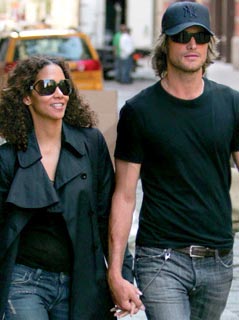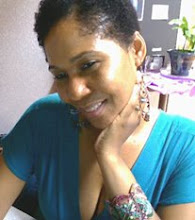New Frontiers in Interracial Dating?
 "I Heart White Men."
"I Heart White Men."
You probably won't see that T-shirt hanging from a kiosk in the Crenshaw District or on 125th Street in Harlem, but merchandise marketing black women’s interracial relationships may be coming to a cyber store near you.
Earlier this year, I joked about creating a line of “Looking for Mr. White” tees for black women. My idea was a tongue-in-cheek response to the proliferation of black male/white female couplings, and also a nod to what I called the “Something New Movement” — an increased number of sisters choosing to date outside the race.
The blog Black Female Interracial Marriage appears to be on the verge of a similar movement – branding colorblind love. Created by Evia, a black woman married to a white man, the site recently posted information on this campaign: “Sistas, what words would scream IR interest yet be subtle enough for you as a bw to wear or have on your totebag?” Evia asks. “I will be selling gear (tote bags, caps, shirts, etc.) here that will signal to others in a subtle way that you are receptive to the possibility of an IR relationship of varied types.”
I must confess, reading Evia’s blog has become a guilty pleasure for me. The sidebar of her site features photos of famous and not-so-famous sisters happily embracing their white partners. Evia often pontificates on the beauty and desirability of black women, and encourages her readers not to limit their dating options to black men. She comes across as the Harriet Tubman of outmarriage, leading her charges to the Promised Land of Interracial Love.
In this world, black chicks rule. Her site celebrates black women – in all their hues – and provides balance to IR mainstays Heidi and Seal, Tiger and Elin that saturate the pages of US Weekly and People. Her space offers kinship and community to interracially involved black women who feel ostracized by society, or who simply want to see a loving representation of their relationships. I get Evia’s message. I really do. But I’m uncomfortable with the idea of preference as product. Do sisters really need a discreet logo or badge to signify that they’re open-minded about relationships? And why does the insignia have to be “subtle”? Is there an unspoken fear that black women will catch a beat-down from black men for flaunting their interracial desires on designer totes, mugs and key chains? If this trend takes off, what’s next? A secret society complete with handshakes and passwords?
I get Evia’s message. I really do. But I’m uncomfortable with the idea of preference as product. Do sisters really need a discreet logo or badge to signify that they’re open-minded about relationships? And why does the insignia have to be “subtle”? Is there an unspoken fear that black women will catch a beat-down from black men for flaunting their interracial desires on designer totes, mugs and key chains? If this trend takes off, what’s next? A secret society complete with handshakes and passwords?
Just as I have issues with brothers who exclusively date non-black women, I am also suspicious of sisters who omit the color black from their kaleidoscopic courtships. People should be free to love whomever they please. But is interracial love still colorblind when you actively seek out mates based on skin tone? I would have a problem if Hakeem passed me on the sidewalk wearing an “I Heart Becky” hat. Although Evia often says black women should be open to potential suitors in a variety of races, not too long ago, she featured an “I Love Vanilla” button campaign on her site.
Here’s a suggestion: For those sisters who want to alert others that they’re open to dating out, why not purchase an orange awareness ribbon? The ribbon not only promotes cultural diversity, but also symbolizes solidarity with those fighting world hunger, lupus and Multiple Sclerosis. You can be an activist and get your interracial flirt on at the same time. Doesn’t that sound better than endorsing walking product placement?






